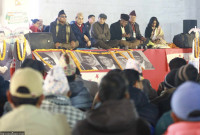Opinion
A bug’s life
When it comes to hydro projects, local people must be helped to understand the basic concept of shares
Sophia K Tamot
Of late, a new bug has bitten us Nepalis. I would like to call it the ‘local share’ bug. This bug is specific to hydropower projects and is reminiscent of the hyped public interest that peaked in real estate almost a decade ago, which followed a mad scramble to invest in land and anything to do with construction.
These days, anyone and everyone on the streets and on social networks seems to be talking about local shares—from village folks directly hit by such dams and their neighbours to city dwellers looking for lucrative profit-making ventures, from businessmen and politicians to our migrant brothers and sisters toiling in distant lands.
Granted, the lure of quick, almost guaranteed profits with low risks is too tempting of an opportunity to pass. No wonder then, that when a few hydropower companies opened up for Initial Public Offerings (IPOs), they were oversubscribed by more than a hundred times. But with time, as most bugs’ often do, this one seems to have taken on a more sinister form. The concept of local shares today is a far cry from how it all started when it was first born. And with each passing project, it continues to mutate and evolve.
The Chilime effect
It all started in 2003 with a 22.1MW project called Chilime. Hailed as a people-public-private-partnership model, local shares were aimed at raising local capital, promoting local ownership, generating local pride, and profit sharing locally. Its shareholders, including almost every household member in Rasuwa district, reaped cash and stock dividends year after year. It has been over 10 years hence and market value continues to climb. So in all fairness, this was clearly a model just begging to be replicated.
Following in Chilime’s footsteps came the 456 MW Upper Tamakoshi. The share euphoria was clearly gaining momentum. Encouraged by widespread public support and the public’s overwhelming interest to invest, parliamentarians hailed it as the next best thing since sliced bread and also saw it as a probable resolution for putting an end to project obstruction from locals.
All hydropower projects have since been following the recommendation to make available up to 10 percent of their shares to local communities. Such a move means that local people will now be perceived as key stakeholders, and not just project beneficiaries. For those who are likely to have their homes inundated, involuntarily resettled, and livelihoods altered, tangible monetary benefits like equity shares that hold promise of an assured income for years can sound like manna from heaven.
New actors
But more recently, a new set of interlocutors has entered the equation and their motive is questionable. They claim to be fighting for locals’ rights to purchase shares. However, what they do not visibly express is the sentiment that they expect to also fit in, quite neatly, into the ‘local’ category. For months, political cadres of the Nepali Congress (NC), CPN-UML, and the UCPN (Maoist) physically blocked the Bhotekoshi project from repairing four transmission towers, cutting off 45MW of electricity from the grid until the company was forced to agree to their demand for shares. The initial asking was 35 percent, which fell to 22 and then to 10, until the parties eventually settled for six, following high-level intervention that involved the prime minister himself. All this, when the leaders of these very parties are in dispute over finalising the constitution. Damn, that bug must be extremely powerful.
Questions relating to the rule of law aside, the dangerous precedent here is that the Bhotekoshi case may encourage more of such interlocutors, determined to exercise what they see as their inherent right to a piece of the pie. Clearly, local politicians were simply positioning themselves to take advantage at the right time. And we have seen the signals. Just earlier this year, the Securities Board of Nepal (SEBON) initiated an investigation to probe fraud allegations on trading of Chilime shares, acting on complaints that alleged agents had conned and underpaid Rasuwa residents for shares at sub par market value. But no one really knows what happened.
Local people in the villages are not really aware of how shares work or how and when they will actually receive dividends in the form of cash. Just last week, I came across such a bunch. One thing they shared in common was excitement. A hydropower project was going to be constructed in their district, which meant they were eligible to purchase shares. They had saved up some money and had heard that investing in hydro shares was very lucrative. When quizzed about what they knew about shares in general, each and every face drew a blank. All they felt was that everybody they knew talked about shares and each of them had to buy some.
Help them know
Little knowledge can be dangerous. It can create loopholes for others to take undue advantage; it can breed misunderstanding and intensify mistrust, especially if there is low confidence to begin with. And before one realises it, things can quickly spiral out of control. We have experienced such instances in various sectors—from foreign employment to pyramid schemes and horticulture.
But access to information is also not enough. Complex issues need to be broken down into local context and aided by stories that resonate, through examples that people can identify with. Then the pieces need to fit together. The first part of the puzzle is the project cycle. People need to be aware of the project’s anticipated timelines for pre-construction activities, construction period, and actual generation. Tied to these are important questions whose answers potential shareholders have a right to know. Questions like when are shares going to be made available for sale, what kind, to whom, and at what price? What is the loan pay-off period? When can I expect to see my first dividends arrive? How are the dividends going to be structured? Will I have voting rights? What happens if the company goes bankrupt? And so on and so forth.
Ensuring that people understand the basic concept of shares, whether ordinary or preferred, the risks involved, the gestation period before dividends actually begin to trickle in, the kind of rights that come with it, the kind that do not, and what they are worth are lessons that every company and every issue manager, including the government, must be willing to impart. Only then will the local people truly be empowered to make informed choices, including uprooting the weeds, the impostors, and counterfeits out from the equation.
Some bugs, if they don’t kill you, make you stronger.
Sophia K Tamot is a consultant at the Investment Board and works closely with the government and private sector




 17.12°C Kathmandu
17.12°C Kathmandu










